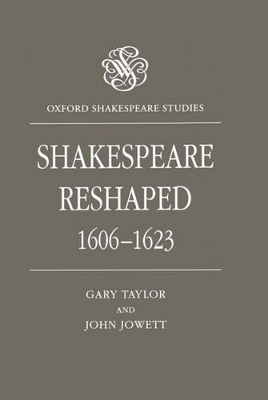Oxford Shakespeare Studies
1 total work
Gary Taylor and John Jowett explore the ways in which Shakespeare's texts were reshaped in his lifetime and up till the publication of the First Folio, and the kinds of outside interference to which they were subjected. As well as the powers of censorship of the Master of the Revels, in this period these included moves to expurgate profanity; major changes in theatrical conventions, notably the imposition of act divisions; and the late introduction of material by other hands.
Political censorship of individual plays has already been studied in some depth: Shakespeare Reshaped concentrates on the forms of interference - expurgation, Act division, interpolation - which can usefully be examined across the whole canon, and which resulted in 'late reshaping'. These influences were at work between May 1606 and November 1623, and - unlike the political censorship, which would have come into effect immediately the plays were submitted for a licence - affected the texts years after they were first written. There is a major central study of Measure for Measure, which underwent posthumous interpolation: the book makes a strong claim for this being at the hands of Thomas Middleton.
Shakespeare Reshaped will be important to all future textual scholars and editors of the plays.
Political censorship of individual plays has already been studied in some depth: Shakespeare Reshaped concentrates on the forms of interference - expurgation, Act division, interpolation - which can usefully be examined across the whole canon, and which resulted in 'late reshaping'. These influences were at work between May 1606 and November 1623, and - unlike the political censorship, which would have come into effect immediately the plays were submitted for a licence - affected the texts years after they were first written. There is a major central study of Measure for Measure, which underwent posthumous interpolation: the book makes a strong claim for this being at the hands of Thomas Middleton.
Shakespeare Reshaped will be important to all future textual scholars and editors of the plays.
